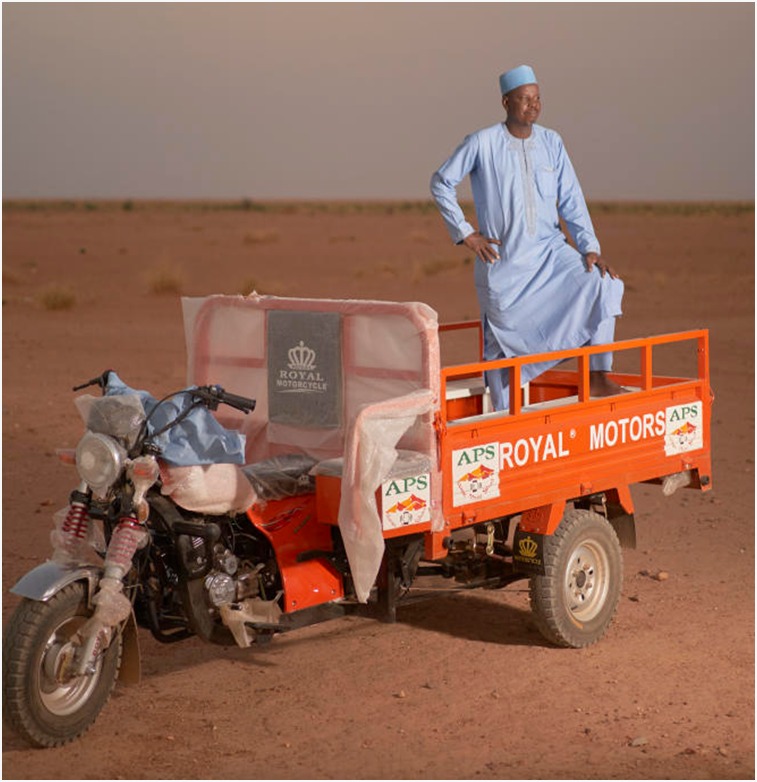
Thanks to the tricycles of the “Alarme Phone Sahara” association, the former teacher helps migrants turned away by the Algerian authorities on the other side of the border with Niger.
A thirty-year career in education, a small family home in a peripheral area of the Nigerian city of Agadez, a dusty Toyota Corolla that he has been dragging for eleven years … Azizou Chehou’s life is, at first glance, nothing extraordinary. However, the 56-year-old man who comes to the aid of the shipwrecked in the desert saves, every year, almost as many lives as a doctor.
Week after week, hundreds of them wandering in the sands, turned away by the Algerian authorities on the other side of the border with Niger. Men from West Africa, thrown from the dumpsters of the trucks where they were piled up, who have no choice but to walk to the village of Assamaka, crossing fifteen kilometers of desert. It is this stretch road that the tricycles of the Alarm Phone Sahara Association (APS) of Azizou Chehou criss-cross.
With their vehicles, they help those who can no longer walk, take them to the village where a UN transit center is to receive them. In this piece of desert, there are many enemies of migrants: bandits on the Nigerian side, military patrols on the Algerian side.
In recent weeks, the deportations by Algeria have never been so numerous: while about 20,000 people had been turned away over the whole of 2022, APS has already recorded nearly 15,000 thrown into the Sahara during the first quarter of 2023.
Bilma, in the middle of the desert
Sometimes, when the yellow vests of APS find them, the migrants are already dead. “It’s a shame what’s happening there,” emphasizes Azizou Chehou. In the Mediterranean at least, the sea rejects the bodies, while the Sahara swallows them. We will never be able to know how many people have died here in indifference.
Born in a small Kanuri village in the Zinder region, in the south of Niger, nothing predestined this son of a farmer to land in the Sahara. A studious student, he went to study at the University of Niamey at the end of the 1980s, when political turbulence was germinating in West African universities.
It is the time of national conferences and young people who are demanding democracy and multi-party rule after years of authoritarian rule. Within the Union of Nigerien Schoolchildren (USN), the student union center, the young Azizou is in charge of monitoring the police forces who come to the university campus.
But he quickly pays for his union commitment: when he is appointed teacher at the end of his degree, while he was dreaming of working in an institution in the capital, he was sent him to … Bilma, in the middle of the desert, not far from Libya. You have to imagine the bled: a few hundred inhabitants, a seven-day trip on the roof of a truck from the local date cooperative to reach the regional capital Agadez and, sometimes, a military plane that lands in the sand for military rotations. There is an air of the Tartar Desert in this small village where a garrison stands guard against possible Libyan or Chadian incursions.
“A crossroads of migrations”
The young teaser goes there backwards, with his 150 cassettes (it’s a disc jockey in his spare time), his two suitcases and his portable stove for making tea. But on the spot, it is a discovery. “You quickly get the hang of it. I took over the local bar: we had the beers with the soldiers and the rest was brought in from Libya,” he says. He stays there for two years, made friends, returned to Agadez for a future nomination. The young teacher in shirtsleeves, single and laughing, capsizes the girls.
Thirty years pass according to the assignments. He soon has four children and a house in Agadez. Azizou belong to the middle class who do not seek the light of the wealthy but make their own way. At the end of 2015, he met the journalist Ibrahim Manzo Diallo during a visit to his office at Aïr Info, the main media outlet in northern Niger. The hyperactive Azizou started writing for him. “He has a definite passion for writing and a talent for entrepreneurship,” says Manzo, who quickly appointed him editor-in-chief of his newspaper.
In the pages of the only paper newspaper in northern Niger, he writes about everything, but migration comes back page after page: here, it has always been a thriving business. “Being at a crossroads of migrations brought at one time a lot of work here. Operating in this traffic was criminalized [in 2015]. Everything has changed,” he emphasizes.
So when Mr. Diallo launched in 2018 of the small APS association with German associative supporters, it is obvious: Azizou Chehou would take over the torch. He hesitated: he was preparing his thesis and already had to manage his other association for unemployed young people in his neighborhood.
A few months later, the thesis is completed and the migration crisis is accentuated on the Algerian border. APS tricycles keep rolling through the sand and coordinator Chehou’s phone rings constantly. As for the village of Assamaka, it becomes this spillway where thousands of migrants gather waiting to be taken care of by the UN and international NGOs
Source: Amaury Hauchard (Le Monde newspaper)

